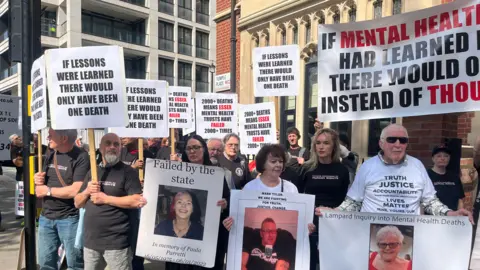Mental health boss 'heartbroken' by patient deaths
 EPUT
EPUTThe chief executive of a trust at the centre of England's first public inquiry into mental health said the testimonies of bereaved relatives had been "brave, powerful and heartbreaking".
The Lampard Inquiry is looking into the deaths of 2,000 people in mental health units in Essex between 2000 and 2023.
Paul Scott, from Essex Partnership University NHS Foundation Trust (EPUT), said what relatives said had "deeply affected" and "motivated" him to make a difference.
Families of those who have died said they wanted the inquiry to be a chance for lasting change.
Giving evidence at the hearing in London, Mr Scott said: "I'd like to offer an apology and condolences to all families who have lost loved ones under the care of Essex mental health."
He said hearing testimonies during the inquiry, which also had sessions in September and November, had moved him.
"They've been brave, powerful and heartbreaking," said Mr Scott, who became chief executive in 2020.
"These have deeply affected me and motivated me to make a real difference and I'm sorry for their enduring pain.
"Since joining the organisation I have given everything I have to try and improve safety and I will continue to do so."
 Richard Daniel/BBC
Richard Daniel/BBCEPUT was fined £1.5m in 2021 for safety failings over the deaths of 11 patients.
Mr Scott said facing families in court was one of the "most profound days of my life".
He said it was "shocking to listen to very powerful testimonies of families in the courtroom, how they'd been failed, the impact it had on them".
"The responsibility I felt to address that was very powerful with me," he added.
But Mr Scott said he felt "overwhelmed by the number of regulators" overseeing the trust after it was fined by the Health and Safety Executive.
He claimed at one point there were thousands of recommendations to implement from 19 organisations.
Counsel to the inquiry, Nicholas Griffin KC, called it a "crowded and confused regulatory landscape".
'More to do'
During the hearings, families have accused EPUT of complacency and being defensive over mistakes.
However, Mr Scott argued that was "far from the case" and stressed the deaths were always on the minds of staff.
He said he understood families felt things had not changed and admitted there was "a lot more to do".
Asked what had caused issues for the trust, Mr Scott blamed low staff numbers.
He said key financial decisions needed to be made to dictate the future of mental healthcare.
Follow Essex news on BBC Sounds, Facebook, Instagram and X.
